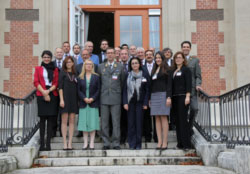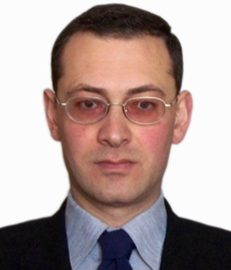Ukrainian Gas Transit: Still Vital for Russian Gas Supplies to Europe  By Jack Sharples, Research Fellow of the Oxford Institute of Energy Studies and EGF Associate Researcher on the External Dimensions of Russian Gas By Jack Sharples, Research Fellow of the Oxford Institute of Energy Studies and EGF Associate Researcher on the External Dimensions of Russian Gas
With European gas import demand having risen substantially since 2014, Gazprom has dramatically increased its sales on the European market. In Q1 2018, Gazprom reported record daily gas exports to Europe in late February and early March. This Comment addresses the question of how those volumes were delivered to the market, and the extent to which the infrastructure for delivery of those volumes was used, highlighting that, in times of peak European gas import demand, full utilisation of the Nord Stream and Yamal-Europe pipelines left Ukraine as the only transit route with spare capacity. READ MORE
- Wednesday, 16 May 2018, 20:57
“Towards Europe?! Straddling Fault Lines and Choosing Sides in the South Caucasus” 10th Workshop of the PfP Consortium’s “Regional Stability in the South Caucasus” Study Group (RSSC SG)
 On 6-8 November, 2014, the PfPC and the Austrian National Defense Academy jointly organized the 10th Workshop of the RSSC SG at “Schloss Rothschild” in Reichenau (Austria). This workshop offered a platform for constructive dialogue among government and academic experts on the prospective roles of the EU and the Eurasian Economic Union (EEU) in breaking the current deadlocks in the resolution of the protracted conflicts in Abkhazia, South Ossetia and Nagorno-Karabakh. During this workshop, a panel moderated by George Niculescu, the Head of Research of EGF, examined the background and the potential implications from the perspectives of South Caucasus (SC) states of having to make undesirable choices between the EU and the EEU. The panelists’ presentations and the ensuing discussion highlighted that, against the backdrop of the Ukrainian crisis, maintaining freedom of choice on the ways and levels of engagement with both the EU and the EEU is a critical interest for each SC state, and a prerequisite for effective conflict resolution. In this context, Mr Niculescu thought that “the EU might work towards developing options for harmonizing the European and Eurasian integration normative systems. One of the options to be explored might involve sustaining post-conflict regional economic cooperation as a way to circumvent the dilemma of the states caught in-between competing European and Eurasian integration processes.” READ MORE. Please see the relevant post on Facebook here. On 6-8 November, 2014, the PfPC and the Austrian National Defense Academy jointly organized the 10th Workshop of the RSSC SG at “Schloss Rothschild” in Reichenau (Austria). This workshop offered a platform for constructive dialogue among government and academic experts on the prospective roles of the EU and the Eurasian Economic Union (EEU) in breaking the current deadlocks in the resolution of the protracted conflicts in Abkhazia, South Ossetia and Nagorno-Karabakh. During this workshop, a panel moderated by George Niculescu, the Head of Research of EGF, examined the background and the potential implications from the perspectives of South Caucasus (SC) states of having to make undesirable choices between the EU and the EEU. The panelists’ presentations and the ensuing discussion highlighted that, against the backdrop of the Ukrainian crisis, maintaining freedom of choice on the ways and levels of engagement with both the EU and the EEU is a critical interest for each SC state, and a prerequisite for effective conflict resolution. In this context, Mr Niculescu thought that “the EU might work towards developing options for harmonizing the European and Eurasian integration normative systems. One of the options to be explored might involve sustaining post-conflict regional economic cooperation as a way to circumvent the dilemma of the states caught in-between competing European and Eurasian integration processes.” READ MORE. Please see the relevant post on Facebook here.
- Friday, 20 February 2015, 18:32
Russia Seeks Increased Control of Karabakh Resolution After Clashes Between Armenia and Azerbaijan*
 Armen Grigoryan, Armen Grigoryan,
EGF Guest Contributor
After the recent clashes between Armenian and Azerbaijani forces, Russia’s leadership attempts to act more decisively in order to compromise the OSCE Minsk Group mediation efforts and to compel Armenia and Azerbaijan to accept Russia’s special role in the region. Russia’s proximity and strong influence over political elites and societies gives it an advantage over other Minsk Group co-chairs – the U.S. and France. However, the lack of security guarantees and economic perspectives may induce Armenia to start reviewing its attitudes concerning relations with different international actors and regional integration frameworks. READ MORE
This article was first published by the "Central Asia-Caucasus Analyst, Central Asia-Caucasus Institute & Silk Road Studies Program Joint Center" which holds the copyright for it.”
- Tuesday, 25 November 2014, 20:55
Implications of the Crimea Crisis for Energy Markets: Vulnerabilities of Markets and Weakness of States
 Dr Andrei V. Belyi, Dr Andrei V. Belyi,
EGF Guest Contributor
A crisis of international governance spreads into the political sphere and puts under peril the peace between the Russia and Ukraine, in addition to heightening tension between Russia and the West. The political rhetoric from Brussels, Moscow and Washington increasingly resembles that of the Cold War. Many ask if there are serious implications in security of energy supply, as well as in investment and trade, either among causes or consequences of current events. The current situation demonstrates a deep vulnerability of states in the face of markets, and will be analysed along three groups of energy implications: transit-supply flows, investments and effects of sanctions. READ MORE
- Tuesday, 25 November 2014, 20:53
Exploring the Role of Economic Initiatives as Peace Building Tools in the Nagorno-Karabakh Context
A highly successful roundtable discussion on Exploring the Role of Economic Initiatives as Peace Building Tools in the Nagorno-Karabakh Context took place on the 27th of March, 2014, at the European Parliament. The event was organized by the European Geopolitical Forum and international NGO partners, and was attended by more than 40 experts from the South Caucasus region and Brussels-based think tanks and international organizations who engaged in discussion in a constructive, informal ‘atmosphere of exchange’. The roundtable focused constructive energies on discussing a common future in an economically integrated South Caucasus, as a way to build mutual trust aimed at helping to overcome the current stalemate within the political and security negotiations. Please click here for the summary of conclusions of the event. READ MORE.
- Wednesday, 16 July 2014, 20:33
Russian Gas Supplies to Europe: the Likelihood, and Potential Impact, of an Interruption in Gas Transit via Ukraine
 Jack Sharples, EGF Associate Researcher and Andrew Judge, EGF Guest Contributor Jack Sharples, EGF Associate Researcher and Andrew Judge, EGF Guest Contributor
The current tensions in Ukraine have generated speculation about the security of Russian gas supplies to the EU via Ukraine. This short article analyses the likelihood of a suspension of Russian gas supplies via Ukraine and the impact of such a suspension on EU gas imports. We find that a suspension of gas transit is far from inevitable, but cannot be ruled out. The impact of such a suspension would disproportionately affect Central and South-East Europe, with this region divided between those that have access to gas storage and/or alternative supplies, and those that do not. In this regard, Bulgaria remains the only EU member state in this region that has neither sufficient gas storage nor access to alternative supplies. READ MORE
- Monday, 24 March 2014, 19:30
Energy Relations between Gas-Troika Members and the European Union
 Fatemeh Shayan, University of Eshfahan, Iran Fatemeh Shayan, University of Eshfahan, Iran
University of Tampere, Finland
Guest contributor to EGF
Do such organisations exist beyond the ‘self fulfilling prophecy’ level?
Much research has examined energy relations between the European Union (EU) and Russia,[1] but not the larger picture of energy relations between the EU and the Gas-Troika, made up of members Russia, Iran and Qatar. Although the Gas-Troika is in an early stage of development, increasing demand for gas, especially from the EU, has noticed members to attempt to present it as a future gas superpower. READ MORE
- Friday, 17 January 2014, 07:57
|
|
